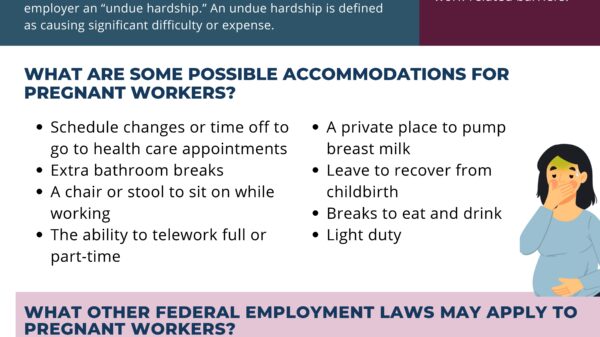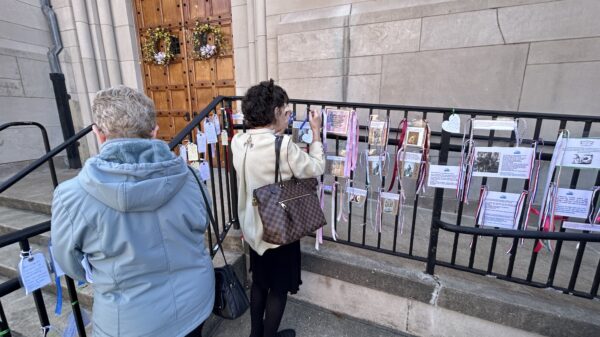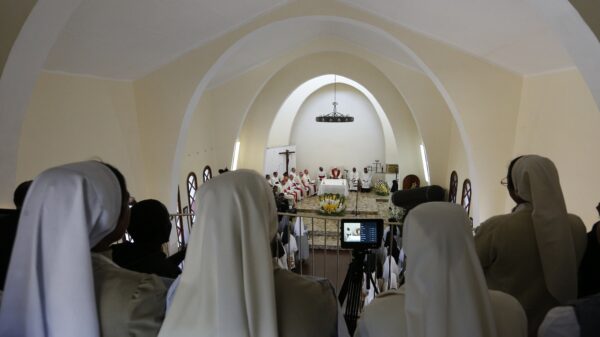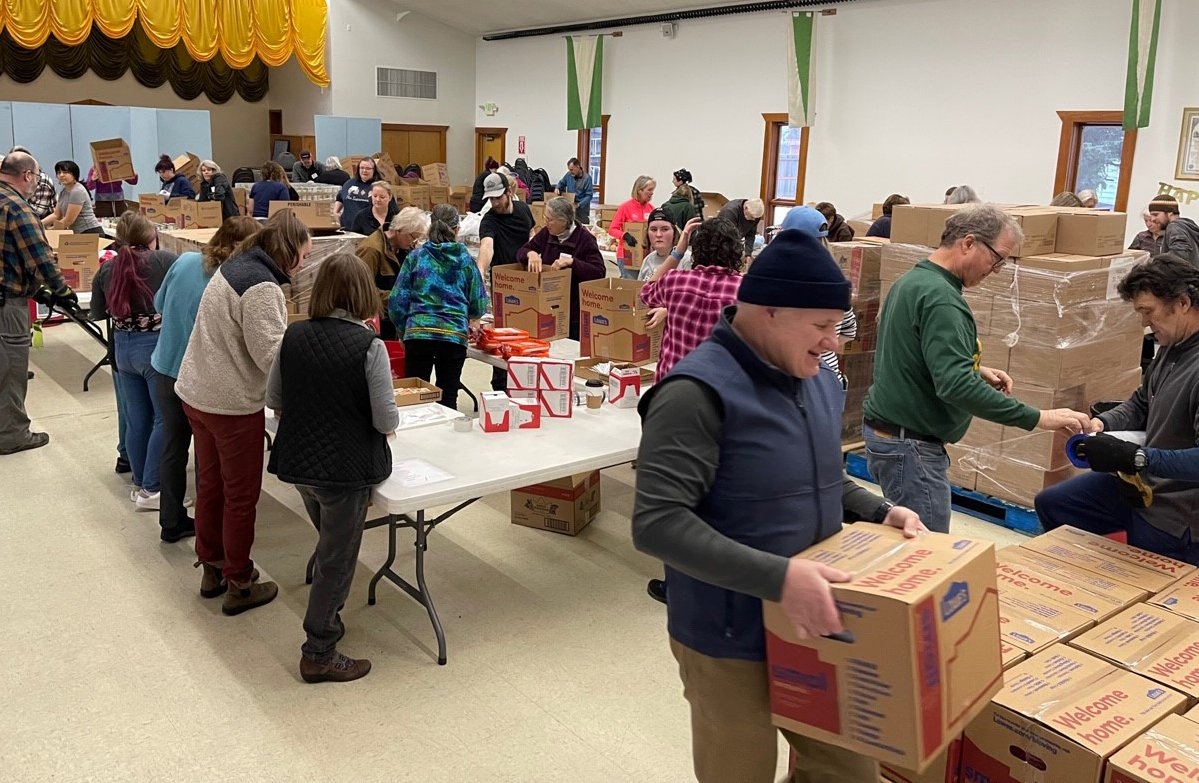By Naomi Klouda
ANCHORAGE, Alaska (OSV News) — Catholic organizations and churches in Alaska have been busier than ever this past year due to months-long delays in the arrival of the state’s food stamp program benefits to thousands of Alaskans.
Yet, this challenge prompted a prolific outpouring of help from Catholic donations. From the beginning of Lent to Easter, Catholic Social Services collected 10,000 pounds of food from parishes and churches. The food went to the St. Francis House Food Pantry in Anchorage, one of the largest food distribution centers in the state.
Juneau, which also saw many families impacted, struggled to meet a goal to collect 6,000 pounds of food during Lent.
The problems arose after the state of Alaska budget cuts proposed by Gov. Mike Dunleavy resulted in layoffs at the Division of Public Assistance in 2022, resulting in a slow turnover of recertification applications for many Alaskans who rely on the benefits.
“The State Public Health Emergency ending was not the cause of the backlog,” according to a statement from the Division of Public Assistance. “The factors leading up to the backlog include clarification from the Food and Nutrition Services that SNAP cases could no longer be auto-rolled forward. Due to the cyber-attack on the IT systems that were not successfully implemented, the decrease in Division staff could not manage the number of recertifications that occurred in one month.”
In addition to the delays, food stamp eligibility requirements were returned to their pre-pandemic levels when Alaska’s pandemic-era Emergency Allotment Program expired in September 2022, which meant dollar-amount cutbacks for many families. The problems persisted throughout the winter, resulting in thousands of families being impacted across the state.
A mother of four who utilizes St. Francis House said she was trying to renew her SNAP (Supplemental Nutrition Assistance Program) eligibility, which must be done each year, and sent the paperwork in September 2022. Three of her four children are teens. As of early April, she claims to have only recently begun to receive SNAP benefits again.
“When I called, I’m told (by an automated message) there are 130 people ahead of me on the phone — but if you leave a phone number they do call you back,” she told The North Star Catholic, newspaper of the Archdiocese of Anchorage-Juneau. “That tells me there’s still a lot of people in a bind. If it weren’t for the food pantries, I don’t know what we would do because the price of groceries has really gone up. A good rule is that one bag (of grocery purchases) equals $25. But I’m paying $30 or more on average per bag of groceries.”
Visits to St. Francis House Food Pantry doubled from November 2021 to February 2023, directly coinciding with the disruption in SNAP benefits, according to information provided by Catholic Social Services.
During the past three months, St. Francis House Food Pantry has averaged about 70,000 pounds of food distributed per month, which comes out to about two tons for each day of operation, said Molly Cornish, chief of communications for Catholic Social Services.
“Saint Francis House averages about 13,000 pounds per month of donated food from the community and stores. The remainder comes from the food bank and food purchases from local distributors,” Cornish said.
The number of people served by this food pantry alone is more than 3,800 families. Several parishes also host food pantries and distribute them individually to families. St. Francis House distributed 819,978 pounds of food to those families, an average of 116 families per day. All of this is accomplished utilizing only four paid staffers as well as a cadre of 35 “incredible” volunteers, Cornish said.
St. Francis House has had to limit visits from clients to twice a month due to the increase in need and food costs and the decrease in the federal Emergency Food Assistance Program – which helps supplement the diets of low-income people by providing them with emergency food assistance at no cost. Before this, the program, known as TEFAP, allowed people to pick up food once a week.
Elsewhere in the Archdiocese of Anchorage-Juneau, the impact is similar. Dave Ringle, executive director of the Society of St. Vincent De Paul in Juneau, said it feels like more new people come for help every day.
“We saw an uptick in the number of people coming to the emergency food pantry, with more every day,” Ringle said. “We’ve had good donations and set our Lent food drive goal at 6,000 pounds of food. We haven’t quite matched that. We’re barely able to keep up.”
In addition to the challenges of serving more clients, another emergency food pantry — Helping Hands of Juneau — closed its doors in November, Ringle added.
“So, there’s a greater need,” he said. “We see all kinds of challenges. We’re suppliers of low-income housing and our tenants are struggling — paying electric bills or child care, which doesn’t leave much for food.”
Food pantries can only help in emergencies, he added.
“The number is far exceeding resources. These are temporary solutions. Getting the (SNAP) program up and running is the sustainable solution,” Ringle said.
According to Feeding America, for every meal that a food pantry supplies, SNAP provides nine meals. The charitable food sector simply cannot make up for the scale of food insecurity that results from delays and disruption in SNAP administration, Ringle said.
Dunleavy requested $6.8 million to be added to the state’s supplemental budget to address the staffing and training needs at the Division of Public Assistance. The Legislature took expedited action to pass the bill in March, which took effect immediately once signed by the governor.
“This funding will help the Division of Public Assistance hire additional eligibility technicians and contractors to prepare for Medicaid Redetermination and address the public assistance backlog, including SNAP benefits,” said Department of Health Commissioner Heidi Hedburg.
In February, in response to Alaska’s immediate need, the State Department of Health also provided $1.68 million to Alaska’s four regional food banks — the Fairbanks Community Food Bank, Food Bank of Alaska, Kenai Peninsula Food Bank and Southeast Alaska Food Bank — to purchase and distribute food to their respective communities.
Catholic Social Services will be receiving a portion of the large food order recently placed by the Food Bank of Alaska, Cornish said April 5.
Also in February, the governor further proposed an operating budget amendment of $9 million for the Division of Public Assistance “to increase capacity for eligibility determinations to help address the backlog.” He proposed another $54 million for the capital budget to “to fully finish migrating” the division’s eligibility system from an outdated database and into a more “modern system,” Hedburg said.
The Alaska Legislature takes up the budget for debate and passage in the coming weeks.
Naomi Klouda writes for The North Star Catholic, newspaper of the Archdiocese of Anchorage-Juneau. Jay Luzardo, the editor, contributed to this story.









































